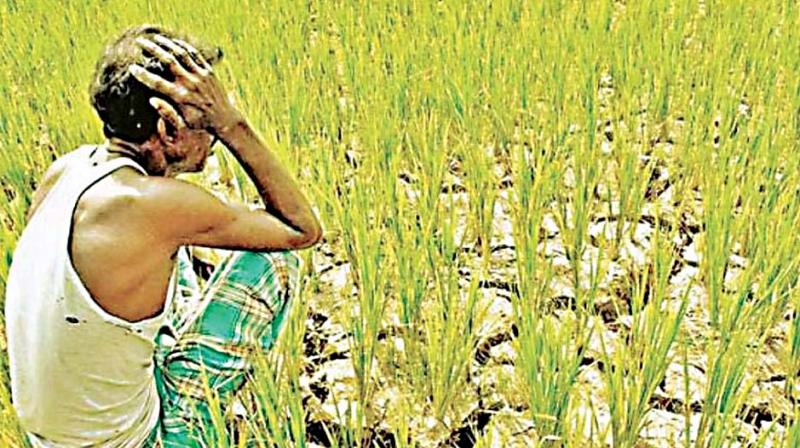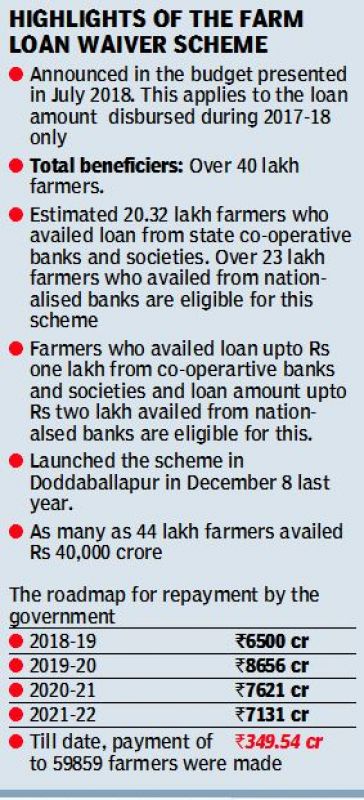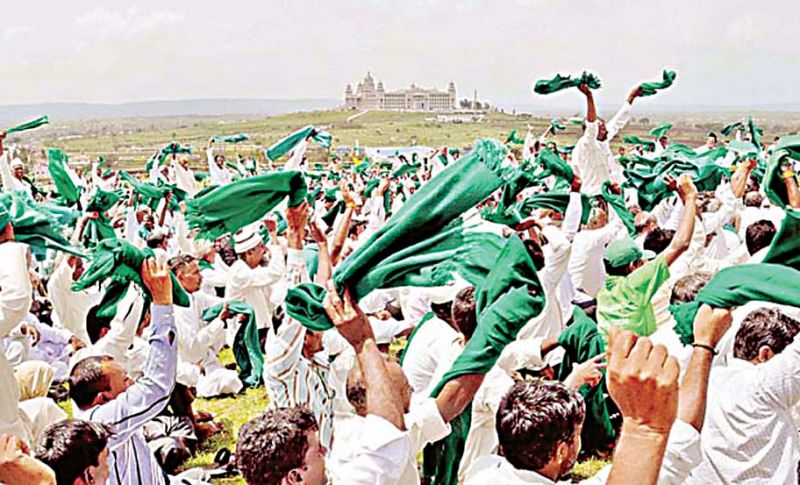The long story: Farm loan waiver Karnataka shows the way
The brain behind this new experiment is Munish Moudgil, Commissioner, Survey and Settlements and Land Records.

When the blazing sun beats down relentlessly on the farmer’s field with no rains in sight, when crops dry up leaving him grappling with the staggering burden of farm loans, starvation and distress, there is little he can do except pray for a better season the next year or else end his woes at the end of a rope. Quick to realise the great damage an unhappy farmer can do to their political prospects and vote banks, politicians of every hue have now and then, come up with balms of various kinds- and one of them is the much touted farm loan waiver. Notwithstanding the debate over the fundamental issue of whether a loan waiver will really ease the farmer’s distress, the ‘politics of care’ has been played out by many states including Karnataka, often disregarding the note of caution sounded by many economists including former RBI governor, Raghuram Rajan. Till recently, states including Uttar Pradesh, Maharashtra and Karnataka had followed the beaten path of ‘book adjustment’ - which means the funds released by the state go to co-operative banks/societies which, on recording the fund release, strike off the names of farmers from the list of loan defaulters. While Prime Minister Modi scoffs at Karnataka’s track record on farm loan waivers, fact is Karnataka has adopted a new method which is why the state government is taking a long time to clear farmers’ loans. What is it and how will it help the government? Is it a boon or bane for the farming community? Bhaskar Hegde does an in-depth analysis of the contentious method adopted for loan waiver
Last week, while interacting with party workers from north Karnataka, Prime Minister Narendra Modi had described Karnataka’s loan waiver scheme as a ‘cruel joke’ hinting that the Janata Dal (S)-Congress coalition government had made a outlandish promise to farmers but failed to deliver it. Rattled over the remark made by none other than the PM, Chief Minister H.D. Kumaraswamy’s father and JD(S) supremo, H.D. Deve Gowda himself tried to ‘set the record straight’. He addressed a press conference in Delhi to send a message to Mr Modi and followed it up by posting a series of messages on Twitter taking potshots at the PM and telling Twitterati how Mr Modi was shedding crocodile tears over farmers.
KPCC president, Dinesh Gundurao too did not miss a chance to hit out at the PM while addressing a press conference in Bengaluru. Just like Mr Gowda, Mr Gundurao reeled out data to back the claim that the coalition government was walking the talk on loan waiver. According to him, the state government would credit funds to the accounts of over one lakh farmers during the second week of this month.
"Karnataka has decided to go for a leak-proof method to reimburse the dues, and so it is taking time. We have introduced a dedicated software for this purpose where a farmer needs to share information about farm land, Aadhaar card number and BPL card besides bank details, father’s name, village, total land owned etc. There are 52 columns in the software for which they need to share information," said co-operation minister, Bandeppa Kashempur while explaining why the process was taking so much time.

"Of the 44 lakh farmers set to benefit from the loan waiver, the identification of over 18 lakh farmers is over. Our CM had released Rs 1,300 crore of which Rs 800 crore has been given to the Apex Bank. There is no paucity of funds. Once the process of synchronising the information is over, funds will be released into the accounts of farmers," Mr Kashempur asserted.
The banks which were initially not positive about the scheme, have finally agreed to waive the farm loans given by them. Mr Kashempur is confident that the new method will ensure only genuine farmers who availed loans, benefit. Why do we need such a system? While the minister says this is intended to minimise the chances of fund misuse,co-operative department officials explained the past experience based on which they felt this new system was better. When former chief minister Siddaramaiah announced the farm loan waiver, it was misused by many.
Expert speak
Whether the loan waiver is good or bad is a different subject. Of course, every system has some flaws. But It is a good move by the state government. We have to appreciate this as the government has developed a system to identify and validate the information of farmers who are eligible for this scheme before disbursing the loan amount. My point is: it should go to the farm loan account only.
— M.S. Sriram, Professor, Micro-finance, IIM Bengaluru
“In villages, co- operative society secretaries misused the scheme by keeping the illiterate farmers in the dark. They took loans in the name of farmers and in turn used the money for doling out ‘loans’ locally at two or three per cent interest. Two, many farmers have land in two or three villages and could draw the benefit of loan waiver multiple times. To avoid this, the government had to come out with a new system,” sources said.
The brain behind this new experiment is Munish Moudgil, Commissioner, Survey and Settlements and Land Records. He devised the Standard Operating Procedure on how the entire waiver system should be executed.
And how does the Karnataka system works? Primary Co-operative societies will fill the Crop Loan Waiver software form and Aadhaar number will be verified. In case, there are variation or spelling mistakes the software will allow the variations upto 60 per cent.

Similarly, the ration card will be cross verified with the database of the food and civil supplies department. Land details provided by the farmers will be cross verified with the Bhoomi database, which has details of the whole of Karnataka.
Once the loan waiver applicant’s form is approved, the Survey Settelement and Land Records department will send the list of names of farmers to the Registrar of Co-operative societies online who, on obtaining the concurrance of the finance department, will send the list along with details of funds to be released to the state treasury which will release the money to the Apex Bank or DCC banks.
From there, the money will go to the respective loan accounts of farmers in different co- operative societies.
What if the names of farmers do not match the records? The government has set up a taluk level committee (TLC) headed by the tahsildar and Assistant Registrar of Co-operative Societies. These committees are empowered to take up the failed cases. In case the farmer has passed away, the TLC will take a call on the legal heir. There are cases where, farm land is divided for technical purposes but family members live under the same roof. In such cases, the persons claiming to be a separate family, should get a new ration card and only then are they eligible to avail the benefit.
What if a farmer has availed loans from both co-operative societies and nationalised banks? Though the government has not spelt out the modalities, sources in the co-operative department said that it would be left to farmer to choose one account where he or she would like to avail the benefit..
It’s still a bit too early to conclude if the new loan waiver procedure will get rid of bureaucratic hassles and be more farmer friendly but those in the echleons of power should know better than anyone else that if promises are not kept in time, if rural distress reaches breaking point, the countryside could see ferment like never before. Karnataka has seen enough farmer suicides in the past few years and there are no signs of this disturbing trend abating. A happy farmer is the cornerstone of a happy nation and Deve Gowda and CM Kumaraswamy who have always projected themselves as saviours of the farmer, are acutely aware of the fact that the more they keep the farmer waiting for a loan waiver which seems to be growing more distant with each passing day, the more severe the backlash. This is something they can hardly afford with the crucial Lok Sabha polls just five months away.

